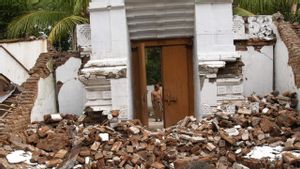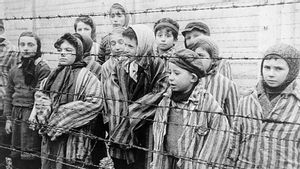JAKARTA - On May 28, 2007, Japanese Agriculture Minister Toshikatsu Matsuoka was found unconscious while hanging in his apartment in Tokyo. He was found hanged hours before facing questions in parliament over his connection to a government funding scandal.
The 62-year-old became the first Japanese minister to commit suicide since the country surrendered in World War II. Quoting The Guardian, Matsuoka was taken to the hospital to get help.
However, he was not helped and died in the hospital. The autopsy also showed that Matsuoka had indeed attempted to hang himself.
Matsuoka's party refused to confirm reports that Matsuoka used a leash resembling a dog harness to hang himself and wear pajamas. According to various reports, Matsuoka has also left behind a series of suicide notes.
His notes included those addressed to the then Prime Minister (PM) of Japan, Shinzo Abe. And there are notes to the public, apologizing for his actions.
Abe was currently facing elections for the upper house of parliament. He was visibly shaken after visiting the hospital where Matsuoka died.
"The effect on the cabinet will be very strong", Abe told reporters. "I feel very conscious of my responsibility as prime minister, and as the one who appointed him".
Matsuoka was previously scheduled to appear before a parliamentary committee to answer a question of an allegation related to an electricity bill for the parliamentary office where the service was supposed to be free. Matsuoka also faces accusations on another matter.
He is accused of accepting election campaign contributions from a businessman linked to a bid-rigging scandal. Abe has defended Matsuoka, often against the advice of some in his own party, saying he has fulfilled his legal responsibilities and will not be fired.

But several Japanese newspaper reports said there were calls for Matsuoka's resignation from the ruling party. Matsuoka's death was another blow to Abe's reign at that time.
Even before the news of Matsuoka's death emerged, published polls showed support for Abe's government was at its lowest since he took office for eight months. Japan's suicide rate is among the highest in the world.
More than 32.000 Japanese citizens committed suicide in 2004. The suicide rate has decreased. But in 2020, for the first time in 11 years, the suicide rate is back on the rise. Most surprising of all, although male suicides declined slightly, the rate among women jumped by nearly 15 percent.
In October 2020, the female suicide rate in Japan was up more than 70 percent, compared to the same month a year earlier. Professor Michiko Ueda, one of Japan's leading suicide experts, said he was shocked to witness the sharp changes in recent months.
"This pattern of female suicide is very, very unusual", she told the BBC.
"I've never seen this much improvement in my career as a researcher on this topic. The thing about the coronavirus pandemic is that the industries most affected are those run by women, such as tourism and retail and the food industry".
Inauguration of the 'Minister of Loneliness'
In April 2021, Japan for the first time appointed a minister specifically tasked with fighting the country's loneliness and isolation crisis that had been exacerbated during the COVID-19 pandemic. Loneliness and the COVID-19 crisis have contributed to the rising suicide rate in Japan.
In response to the alarming numbers of suicides, Japanese Prime Minister Yoshihide Suga assigned 71-year-old Tetsushi Sakamoto to the position of "Minister of Loneliness".
Many health professionals praised PM Suga's move, due to the visible decline in mental health among the elderly, working women, part-time workers, and the unemployed.
SEE ALSO:
The English, Chinese, Japanese, Arabic, and French versions are automatically generated by the AI. So there may still be inaccuracies in translating, please always see Indonesian as our main language. (system supported by DigitalSiber.id)














